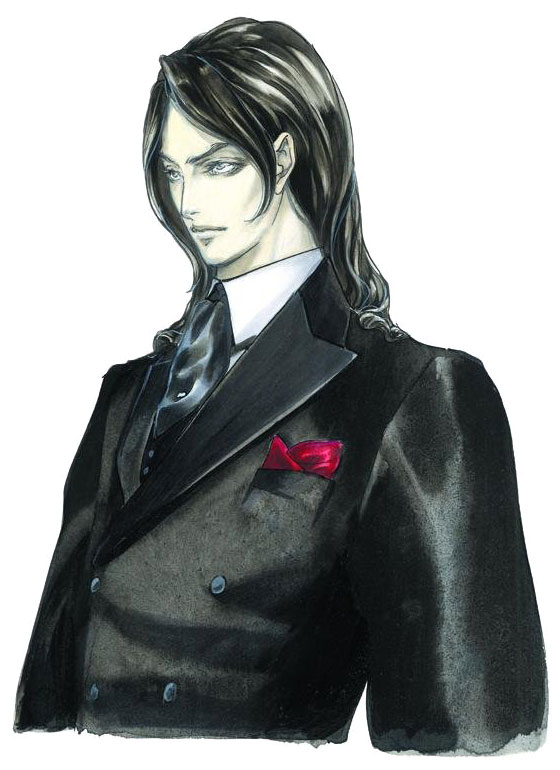profile
well, okay, you could probably just read all this kind of info on a wiki these days. but hey, this isn't a wiki, this is my webpage, and I get to choose the pronouns used on it. and hey- you may or may not be familiar with Castlevania or Alucard. maybe you just know about them just from following my inane rambles elsewhere. so here's a page explaining some of Alucard's background!
history

Alucard is the half vampire, half human child of Dracula. in the 1400s, Dracula fell in love with a human woman named Lisa, and they had a kid together. and no, Dracula didn't name his kid his own name backwards. Alucard's full name is Adrian Fahrenheit Tepes, as they gave themselves the name "Alucard".
see, Dracula and Lisa had a happy family life together, actually. but Lisa was burned at the stake after being tried for witchcraft, and Dracula swore to never forgive humanity for killing his beloved wife. Alucard, on the other hand, was not okay with their father committing genocide. it was then they they chose the name "Alucard", to symbolize being the "opposite" of their father's ideals. this is when Castlevania III: Dracula's Curse happens: Trevor Belmont teams up with a few people - including Alucard - to go stop Dracula from killing all of humanity. but after Dracula was defeated, Alucard felt deeply struck with grief and guilt after having to kill their own father, and sealed themselves away to rest for eternity.
the Belmonts continued doing their thing, in the meantime. every century or so, Dracula or some other comparable threat would inevitably rise once more, and the current Belmont would go and put an end to it. at least... until the events of Castlevania: Symphony of the Night, where in 1797, Dracula's Castle has mysteriously reappeared, with Richter Belmont was nowhere to be found. Alucard was reawakened from their rest, and set out to stop whatever forces were responsible for this, even if it meant facing their father once more.
after defeating Dracula again, Alucard vanishes. no one's quite sure what happens to them for a few hundred years- they don't show up in any of the games that take place in the 1800s/1900s. but in 1999, it's known that they assisted Julius Belmont in sealing away Dracula for good. (this isn't seen on-screen; it's just part of backstory for Aria of Sorrow.)

but in the 2030s, there is a mysterious person known as Genya Arikado, who is known to be working with the Japanese government on top-secret paranormal affairs. during Aria of Sorrow, in 2035, they meet Soma Cruz, an 18-year-old guy who is trying to figure out why he's been suddenly roped into Dracula-related nonsense. as it turns out, Soma is the reincarnation of Dracula's soul. whoops! Arikado has been tasked with making sure Dracula is not revived for the umpteenth time, so it is in their best interests to make sure that Soma doesn't awaken as some evil dark lord.
and then in 2036, during the events of Dawn of Sorrow, some weird cult is out to revive Dracula again, so Soma and Arikado separately set out to investigate it. during the events of the game, there's one ending where Soma loses control of himself and awakens as Dracula. it's then that Arikado is forced to drop their civilian disguise, showing their true form as Alucard. (oh, but then they have to team up with Julius to go kill him, and... it's a mess.)
personality
Alucard is someone of few words- they're kind of blunt and to the point, yet still polite. they're just not really one for conversation or small talk. a lot of sources say that their mother was gentle... I like to think that there is a more kind and sentimental side to Alucard that is not shown very often.
they are normally quite stoic and not easily provoked, but as the Succubus boss fight in Symphony demonstrates... if you dare strike a personal nerve with them, they will be furious. they will still remain calm, but damn, if the line "Death in the dream world will set your soul wandering for eternity, demon." isn't raw as hell. otherwise, I get the sense that deep down, they mostly feel weary and tired. when they have to fight their father at the end of Symphony, they are more disappointed than anything else with having to face him again.
they have a strong sense of personal morals, and are not easily swayed or fooled by others. even when Death himself is demanding that they cease rebelling against their father, they will stare him down and state "I will not."
trivia
- Alucard eats peanuts by tossing them up into the air, and catching the peanut with their mouth.
- the sword and shield that they wield in the beginning of Symphony of the Night - the Alucard Sword and Alucard Shield - are family heirlooms from their mother's side. they still have the sword, even in 2036. how sentimental!
